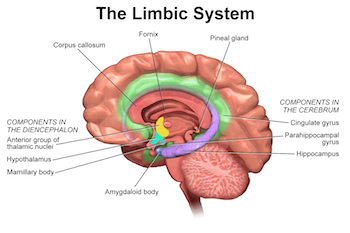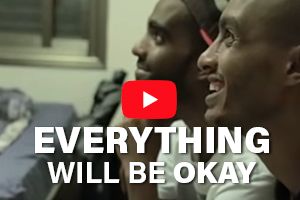How to Manage Your Fear in Scary Times
By Liba Lurie

Every once in a while ‘it’ hits the fan and suddenly the predictability of your regular daily schedule is rudely interrupted by intense fear and unshakable feelings of threat.
Suddenly everything that once felt safe is now a potential risk. You try to ignore it, to think of other things, but the fear is so strong it’s hard to function. You feel numb, irritable and edgy and it seems hopeless because there’s nothing you can do to change what’s happening around you.
But, there are things you can do to help you stay on top of the tidal wave of fear instead of getting bowled over by the swell.
Just knowing how your brain works, and thinking about it, can actually help you control your fear, because it’s up to your brain and how you use it that will mean the difference between managing your fear and losing your mind.

In general, the limbic system works in your favour, keeping you and your loved ones safe from harm. But sometimes, depending on the situation, your limbic system can misinterpret the information coming in.
The limbic system is made up of many parts and operates to receive, interpret and react to outside stimulus so that you can react quickly and protect yourself in times of threat. This is the part of the brain get’s activated and responds when you hear a noise in the middle of the night, or when your kid is about to take a fall and your reach out to catch them. It’s also the part of the brain that reacts when you read a scary news story.
This part of your brain operates automatically and mostly out of your awareness.
Like when you’re taking a pleasant walk in a wooded area and you suddenly freeze in your tracks because you’ve spotted a snake just ahead on the path. In a complex and instantaneous process, your limbic system sends messages to different parts of the brain and you suddenly feel a burst of fear that rushes over you, a wave of heat floods your body, you begin to sweat, your heart starts racing and your breath quickens, all in preparation to fight, flee or freeze.

In some instance, you might notice something that offers you new information, causing your brain to change its course and you feel a welcomed sense of relief and calm - such as realizing you notice that what you thought might be a threatening snake is just a misplaced branch strewn across the path. This triggers your neocortex and all of it’s parts, which is what makes us all human and enables us to think flexibly, reflect on abstract ideas and use words to describe these complex thoughts to others.
Whenever you engage in activities that require the neocortex, you are integrating all levels of the brain, including the limbic system. That means that instead of feeling overwhelmed by a fear response being pumped out by the limbic system, you can be more realistic, more present and calmer.
Just by thinking about how your brain works, you’ve actually activated those tools that will help you to calm your limbic system when you feel overwhelmed by fear. It doesn’t mean that you won’t feel scared, but you’ll be able to be more conscientious and less crippled by your fear.
To learn more of Liba’s tips with her 5 Step Guide CLICK HERE
Reprinted with permission from author. Read original article HERE.
Israel Forever Foundation knows that terror and fear take place around the world. We invite you to ask Liba a question as to how to help you deal with your own worries, from parenting a two-year-old (some of the scariest times of our lives) to the trauma of a violent attack.
To help get the ball rolling, here are a few question we've asked Liba to respond to:
- Do you believe there is a difference between responding to terror in Israel than responding to terror anywhere else in the world?
- How do I teach my kids to be aware, without scaring them?
- Should I talk about the news in front of my children?
- My kids are learning a lot from their friends, how do I censor the information or talk about it?
Add your questions in the comments, and we look forward to sharing Liba's response with you!

LEARN MORE great tips from Liba in this informative interview with Molly Livingstone on the Big Felafel as she offers advice on how to talk to our children about life and death on Israel's Memorial Day, Yom HaZikaron. One key tip she provides is making sure to listen to what they have to say.
Recommended for You:
AM YISRAEL: FOSTERING JEWISH UNITY AND PRIDE

Make your difference and write a Letter of Friendship Today!
About the Author









